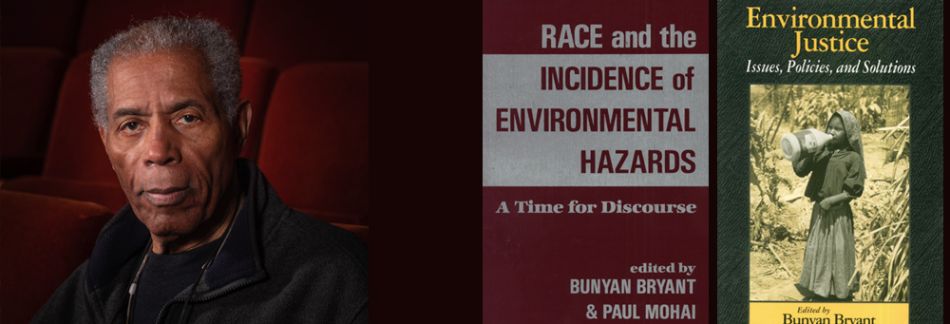
Dr. Bunyan Bryant
Dr. Bunyan Bryant is a Professor Emeritus at SEAS. In 1972, he became the first African-American member of the School of Natural Resources and Environment faculty at the University of Michigan and is considered a pioneer in the field of environmental justice.
During the 1990s, Bryant increased his advocacy for environmental justice to a national level. He organized the first Michigan Conference on Race and the Incidence of Environmental Hazards and joined a group of prominent academics, later known as the Michigan Group or Michigan Coalition. The group wrote letters to Louis Wade Sullivan, the Secretary of the U.S. Department of Health and Human Services, and to William Reilly, the head of the Environmental Protection Agency, asking for meetings with the officials to discuss governmental policy on environmental discrimination. Although Sullivan never responded, Reilly met with them several times, resulting in the creation of the EPA's Work Group on Environmental Equity.[8] Later on, Bryant and Paul Mohai co-published Race and the Incidence of Environmental Hazards, which was one of the first major scholarly books that explored the links between race, class, and environmental hazards.[9][10] This coincided with his establishment of an Environmental Justice program at the University of Michigan which was the first in the country to offer undergraduate and graduate degrees in the specialty.
In 1994, following the signing of Executive Order 12898, "Federal Actions to Address Environmental Justice in Minority Populations and Low-Income Populations," Bryant, Mohai, and Jerry Poje co-facilitated a symposium on Health Research and Needs to Ensure Environmental Justice. The symposium included 1,100 community leaders, scientists, legal experts, and federal representatives. Following the symposium, Bryant received an Award for Research and Creative Projects and Seed Funding for Research.[13] In 1998, he co-published Is there a "race" effect on concern for environmental quality? with Mohai. The article focused on the different concerns black individuals had regarding their environment compared to their white counterparts; such as a larger emphasis on pollution than nature preservation issues.
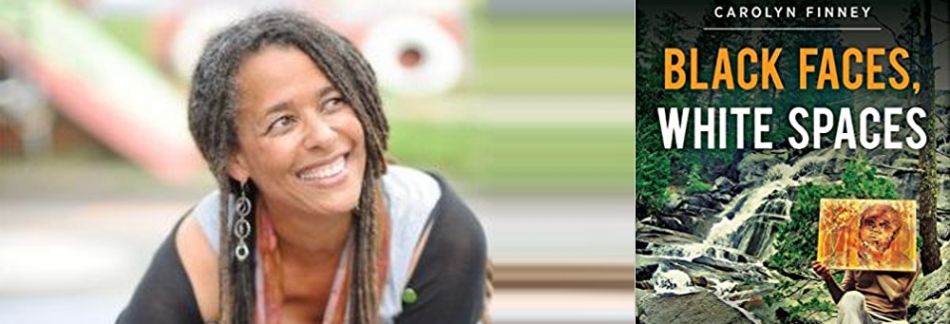
Dr. Carolyn Finney
Dr. Carolyn Finney is a storyteller, author and a cultural geographer. The aim of her work is to develop greater cultural competency within environmental organizations and institutions, challenge media outlets on their representation of difference, and increase awareness of how privilege shapes who gets to speak to environmental issues and determine policy and action. Carolyn has worked with the media in various capacities including the Tavis Smiley Show, MSNBC, & Vice News Tonight; wrote Op-Eds for Outside Magazine & Newsweek; was a guest editor & contributor for a special section on Race & the National Parks in Orion Magazine; participated in a roundtable conversation with REI and The Atlantic; interviewed with various media outlets including NPR, Sierra Club, Boston Globe & National Geographic; and even filmed a commercial for Toyota that highlighted the importance of African Americans getting out into Nature. Along with public speaking, writing, consulting and teaching (she has held positions at Wellesley College, the University of California, Berkeley & the University of Kentucky), she served on the U.S. National Parks Advisory Board for eight years which assists the National Park Service in engaging in relations of reciprocity with diverse communities. Her first book, Black Faces, White Spaces: Reimagining the Relationship of African Americans to the Great Outdoors was released in 2014 (UNC Press).
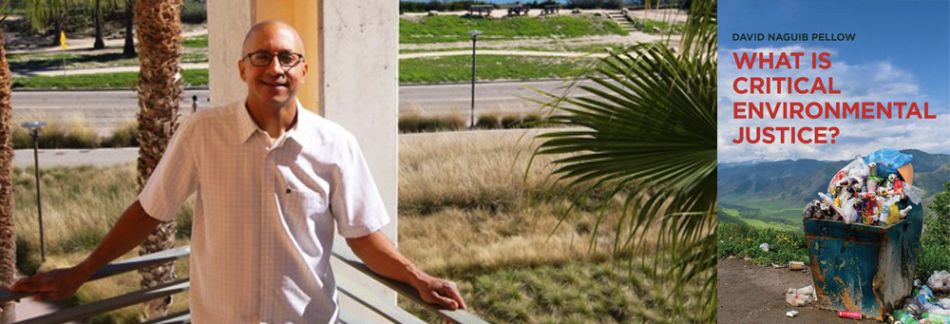
Dr. David Pellow
Dr. David Pellow is the Dehlsen Chair and Professor of Environmental Studies and Director of the Global Environmental Justice Project at the University of California, Santa Barbara where he teaches courses on social change movements, environmental justice, human-animal conflicts, sustainability, and social inequality.
He has published a number of works on environmental justice issues in communities of color in the U.S. and globally. His books include: What is Critical Environmental Justice? (Polity Press, 2017); Keywords for Environmental Studies (editor, with Joni Adamson and William Gleason, New York University Press, 2016); Total Liberation: The Power and Promise of Animal Rights and the Radical Earth Movement (University of Minnesota Press, 2014); The Slums of Aspen: Immigrants vs. the Environment in America’s Eden (with Lisa Sun-Hee Park, New York University Press, 2011); The Treadmill of Production: Injustice and Unsustainability in the Global Economy (with Kenneth Gould and Allan Schnaiberg, Paradigm Press, 2008); Resisting Global Toxics: Transnational Movements for Environmental Justice (MIT Press, 2007); The Silicon Valley of Dreams: Environmental Injustice, Immigrant Workers, and the High-Tech Global Economy (with Lisa Sun-Hee Park, New York University Press, 2002); Garbage Wars: The Struggle for Environmental Justice in Chicago (MIT Press, 2002); Urban Recycling and the Search for Sustainable Community Development (with Adam Weinberg and Allan Schnaiberg, Princeton University Press, 2000); Power, Justice, and the Environment: A Critical Appraisal of the Environmental Justice Movement (editor, with Robert J. Brulle, MIT Press, 2005); and Challenging the Chip: Labor Rights and Environmental Justice in the Global Electronics Industry (co-editor, with Ted Smith, David Sonnenfeld, and Leslie Byster, Temple University Press, 2006).
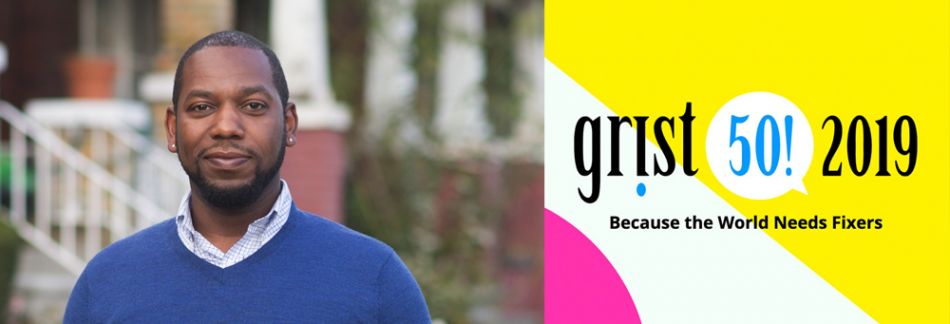
Dr. Tony Reames
As a multidisciplinary scholar, with degrees in engineering and social science, SEAS Associate Professor Reames' research agenda seeks to connect the areas of technological advancement, the policy process, and social equity. His research extends the environmental justice scholarship to focus on energy justice. He is currently exploring disparities in residential energy generation, consumption, and affordability- focusing on the production and persistence of inequality by race, class, and place.
In 2019, Dr. Reames was named to the 2019 Grist 50 Fixers list. Each year, Grist “scours the sustainability space to find up-and-coming people doing potentially game-changing work” for its 50 chosen honorees. Grist reports that it received close to 1,200 nominations for its 2019 cohort. He was also named to Midwest Energy News’ 40 Under 40 which highlights emerging leaders throughout the region and their work in America’s transition to a clean energy economy. Dr. Reames was also a member of the 2019 class of the Oakland County, Michigan Elite 40 under 40, an initiative of former County Executive L. Brooks Patterson that recognizes and spotlights dynamic leaders under the age of 40 who are making a difference in Oakland County and beyond.
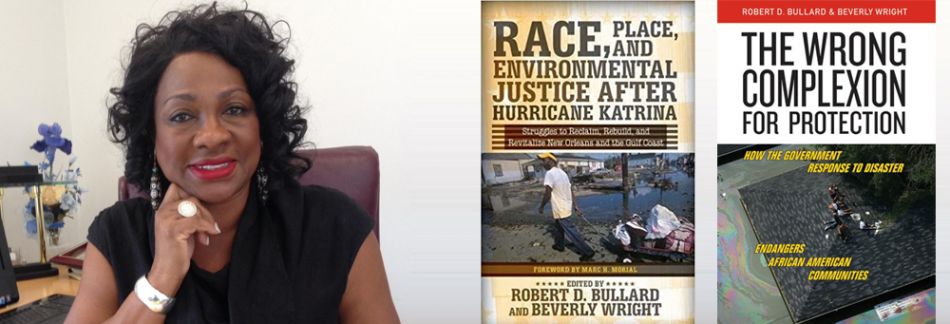
Dr. Beverly Wright
Dr. Beverly L. Wright environmental justice scholar and advocate, author, civic leader and professor of Sociology, is the founder and executive director of the Deep South Center for Environmental Justice. The Center addresses environmental and health inequities along the Louisiana Mississippi River Chemical Corridor and the Gulf Coast Region. The Center is a community-university (communiversity-model) partnership organization providing education, health and safety training and job placement for residents in environmental justice and climate-impacted communities within the United States.
She is the author of numerous scholarly books and articles. She co-authored Race, Place & the Environment After Hurricane Katrina from Westview Press, and The Wrong Complexion for Protection: How The Government Response Endangers African-American Communities

